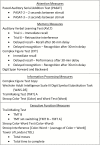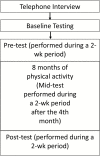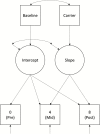The Physical Activity and Alzheimer's Disease (PAAD) Study: Cognitive outcomes
- PMID: 29538632
- PMCID: PMC5853130
- DOI: 10.1093/abm/kax035
The Physical Activity and Alzheimer's Disease (PAAD) Study: Cognitive outcomes
Abstract
Background: Alzheimer's disease is a progressive disease that degrades cognitive functioning and ultimately results in death. Currently, there is no cure for Alzheimer's disease and, hence, the identification of preventative strategies is important. Physical activity (PA) is a behavioral intervention that holds promise with respect to delaying the onset of Alzheimer's disease.
Purpose: The purpose of this study was to explore the differential cognitive benefits achieved in response to PA as a function of a person's genetic risk for AD.
Methods: Older cognitively normal adults (50-65 years) with a family history of AD (FHxAD) participated in an 8-month PA program. Cognitive performance was measured at baseline, pretest, midtest, and posttest and changes over time were assessed as a function of apolipoprotein E (APOE) status (carriers: 1-2 copies of the ɛ4 allele; noncarriers: 0 copies of the ɛ4 allele).
Results: Improvements in memory were associated with PA participation irrespective of APOE ɛ4 carrier status.
Conclusions: Future experimental studies are needed to confirm that PA causes improvements to cognitive performance in older cognitively normal adults with a FHxAD and that these improvements are equivalent for cognitively normal APOE ɛ4 carriers and noncarriers.
Figures
References
-
- Alzheimer’s Association. Alzheimer’s Association Report: 2011 Alzheimer’s disease facts and figures. Alzheimers Dement. 2011;7(2):208–244. - PubMed
-
- Emery VO. Alzheimer disease: are we intervening too late? Pro. J Neural Transm (Vienna). 2011;118(9):1361–1378. - PubMed
-
- Stern Y. What is cognitive reserve? Theory and research application of the reserve concept. J Int Neuropsychol Soc. 2002; 8(3):448–460. - PubMed
-
- Whalley LJ, Deary IJ, Appleton CL, Starr JM. Cognitive reserve and the neurobiology of cognitive aging. Ageing Res Rev. 2004;3(4):369–382. - PubMed
-
- Fratiglioni L, Paillard-Borg S, Winblad B. An active and socially integrated lifestyle in late life might protect against dementia. Lancet Neurol. 2004;3(6):343–353. - PubMed
Publication types
MeSH terms
Substances
Grants and funding
LinkOut - more resources
Full Text Sources
Other Literature Sources
Medical
Miscellaneous




